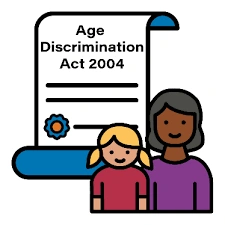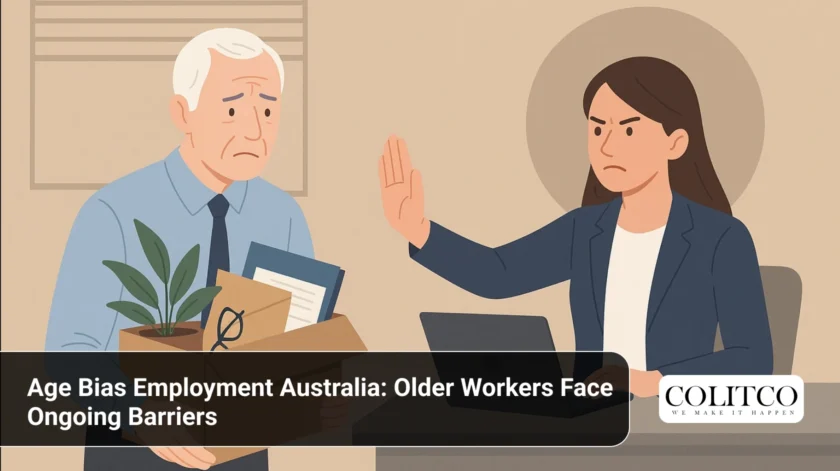Older Australians have experienced and trustworthy characteristics, but continue to struggle with barriers to employment that have existed for a long time. A survey recently conducted shows that 44 per cent of job seekers who are 64 years old and older think that the employer regards them as too old for the job.
Among the 55 to 64-year-olds, the share is 21 per cent who indicate being labelled as “past it.” This widespread stereotype puts a limit on the number of people who can pass the barrier, even when many desire or have to stay in the labour force. The report, which is issued by Reckon, shows that one out of seven job seekers from all age ranges believes that the competition is tough, but the older generation has to face more resistance in this aspect.
Health problems also come up as a major reason for being unable to find a job and thus drawing the line at one’s employment. Nearly 26 per cent of those aged 65 plus state that health issues are one of the reasons why they cannot look for a job, while 20 per cent in the 55 to 64 age cohort give the same reason. All these hurdles put together keep a large number of older Australians off the waiting list for secure and meaningful jobs.

Older Australians still face long-standing job market barriers and bias.
How Does Age Bias in Employment in Australia Affect The Economy?
Age bias in employment in Australia is not only a social problem, but it is also an economic problem. When the national unemployment rate reached 4.5 per cent, which is the highest it has been in four years, many older workers were left out when their talents were most needed. The Australian job market is becoming more and more selective, and it is unwise to ignore the excellent, skilled workers who are available. The tight labour market is, in fact, creating a situation where only the less qualified persons will be participating in the job market.
According to research by Jobs and Skills Australia, workers aged 55 and above suffer an average unemployment period of 86 weeks. This is more than twice the 37-week unemployment period suffered by the 15-54 age group. Unemployment for a long time leads to an increase in the number of people relying on government benefits and a waste of human capital that could have been contributing to national productivity.
Why Does Age Discrimination Against Older Workers in Australia Continue?
Although the Age Discrimination Act 2004 is in place, discrimination against older workers in Australia is still widespread. One of the primary reasons for such discrimination is the misconception that older workers have less ability to adapt to the changing workplace or are not good with technology. Almost 25% of recruiters, according to a survey, consider the 51-55 age group as “older”, and this perception definitely affects their recruitment decisions. These misconceptions become stronger and lead to exclusion, even when many mature Australians are ready to upskill and adjust to the current business environment.
Apart from the perception, family support and health issues can limit job opportunities for the elderly in Australia. Quite a number of them take care of their ageing parents or grandchildren, while others are dealing with chronic health problems. But these situations should not disqualify such employees who have the capability and bring with them decades of valuable experience.

Older Australians’ Job Market Needs Inclusion
The market for older Australians has now become a significant part of the national workforce. Because the life expectancy has been increasing and the retirement ages have been going up, the number of those over 55 who are either staying in or re-entering the workforce is greater than ever. Companies that are ignoring this age group are on the verge of losing a big and skilled workforce. Diversity in age can have a positive impact on the team composition, the reduction of employee turnover, and the improvement of corporate knowledge retention.
The development of inclusive policies is a win-win situation for both the business and society. Respect for older employees in a company results in a stronger workplace culture and increased productivity. The social responsibility argument for inclusion of the older generation has been rejected it is simply a case of good economics.
How Can Employers Reduce Age Bias in Employment in Australia?
To eliminate age bias in hiring, employers in Australia are going to have to thoroughly and immediately prioritise fair recruitment practices. The advertisements for jobs should be directed to the skills and performance of the candidate and not to any assumptions based on age.
Older workers may be given the technical training refresher they’d need through training programs, while their continued participation would be supported through flexible roles. Moreover, mentoring between different age groups within the company would mean that there are fewer hurdles in the way of cooperation among the employees, and there would also be an increase in mutual understanding.
Moreover, it is necessary for the government to continue providing financial support for the reskilling of older workers and ensuring that companies are adhering to the discrimination laws. The government, along with the business sector, have to bear the responsibility of making the age-inclusive employment practice standard and not just an exception.

To end age bias, Australian employers must focus on skills, not age, in hiring.
What Can Older Workers Do To Stay Competitive?
When older Australians are looking for a job, they should put forward their adaptability, reliability, and experience as their main assets. Keeping pace with the technology, doing some networking, and looking for employers who are open to all ages can be the difference-making factors. Whether it is through volunteering or working part-time, the person can build and keep his or her confidence while showing that he or she still contributes to the job market. Older Australians being empowered through individual strategies to be active and valued is also a case, along with systemic change being crucial.
Also read: Breaking Barriers In Business Innovation: A Tragic Reminder For Australia’s Mining Sector
FAQs
Q: What does age-biased employment in Australia mean?
It means that older workers are, at times, not favoured to be taken on because of their age, which usually results in hiring or workplace practices that discriminate against them.
Q: Why are older Australians struggling in the job market?
Their age gives them the bias, health issues, and the assumptions of not having the necessary skills or being inflexible are among the factors that push them back.
Q: Is age discrimination against older workers in Australia illegal?
Age discrimination is not allowed in Australia. The Age Discrimination Act 2004 prohibits discrimination on the grounds of age in employment.
Q: How long do older Australians remain unemployed compared to others?
The unemployment period for people aged 55 and above is an average of 86 weeks, which is more than twice the time the younger workforce has to wait.












